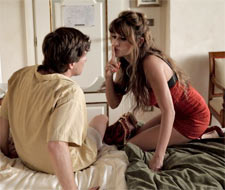 There is much joy to be found in watching the stories unravel in their wonderfully unpredictable ways in To Rome With Love, writes Raja Sen
There is much joy to be found in watching the stories unravel in their wonderfully unpredictable ways in To Rome With Love, writes Raja SenSometimes, all you need is a song.
Woody Allen's latest film opens and closes with the classic Volare, most apropos considering just how dreamy a song To Rome With Love itself proves to be. A work of unashamed whimsy thoroughly drenched in sunlight -- and maybe a drop or three of moonshine -- this is a lark, a terrifically enjoyable and vibrant motion picture that buoys the spirits and refreshes our jaded-jangled nerves. I, for one, must confess that I feared Woody may well have lost the vim needed to concoct this merry a film, saving his odder ideas for his prose excursions. But no fear. To Rome With Love is the cinematic equivalent of a superlative jug of sangria.
There are four streams of story at play, four incredibly different tales that do not deign to intersect, but work alongside regardless -- like serendipitously stuck pages from an idea-crammed notebook -- because of the director's marvellously breezy touch. The rivulets themselves are no more than skits, four kooky what-if analogues, but the mastery lies in the way Allen stirs them -- these stories that don't even share the same time-frame; one takes place over a long summer, one over a singular afternoon -- seamlessly into and across each other, making for a delightful mood piece that remains constantly enchanting, thanks in no small measure to its immaculately picked cast.
An architect finds a younger echo of himself, torn between a stable relationship and the tumultuous potential of infidelity. A man ordinary in every way wakes up famouser than Mussolini. One of the greatest voices in the world only works when moistened enough. A newlywed pair needs severe loosening up; and the Romans are only too glad to oblige. As concepts, these may well involve thinko subjects like hindsight and fame, reticence and infidelity, but instead of aggressively tackling 'em, Allen chooses to tickle. And this he does with consummate skill, peopling his strands with fascinating characters and filling their mouths with the kind of dialogue only he can conjure.
There is much joy to be found in watching the stories unravel in their wonderfully unpredictable ways, so I'll ruin not the plots but concentrate instead on the spells cast between the lines: on the way a brassy wife with the best lines in the film (Judy Davis) stays relentlessly hard to her opera-destroying husband, while offhandedly and constantly shielding him from highly coherent newspaper criticism; on a young wife (Alessandra Mastronardi) making peace with everlasting regret for want of the stories she may gather for her grandchildren; on the poser we can entirely see through (Ellen Page)
There is tremendous magic afoot, but Allen sprinkles it about judiciously, in very varied measure: One architect conjures another up entirely, but the events resulting from this quirky setup are the realest of them all. Meanwhile, the story of the young couple stays almost entirely plausible, but is sculpted from utter happenstance. The other two stories involve a man singing about a great clown and a man proving himself to be one. It's a hard film, as you might imagine, to not constantly smile at. It is also a gorgeous one, with cinematographer Darius Khondji vividly painting a hallucinatory, hauntingly beguiling Rome.
The cast, as said, is excellent. Mastronardi, as the somewhat naive wife, gives the film's finest, most vulnerable performance, while Penelope Cruz turns effortlessly and smoulderingly into a human Jessica Rabbit. Page's artist-craving ingenue is one of Allen's great female characters, and Alec Baldwin comes across stronger, and more evocative, than he's been on the big screen in years.
Famed tenor Fabio Armiliato sportingly provides both great vocal chords and a very likeable character, and Robert Benigni, paddling down his story nearly solo, gives us something very special. The wonderful Jesse Eisenberg turns out to be an inspired choice for an Allen-substitute, and then there's watching Woody himself, having a heck of a good time: at lunch, forced to back off a touchy topic of conversation, the Allen character miraculously walks the rope between polite and pushy, shutting up agreeably but unable to bottle up his enthusiasm, eventually miming for emphasis. Vintage Woody, this.
The master is now 76, and may he never cork that loony imagination. He might merely want to amble around Rome whistling to himself, but, even done as casually, the results are often symphonic. You just need to listen right. If he now feels like cutting up some fruit into chunks and tossing it into an iced jug of not-topshelf wine, those of us complaining and comparing are the ones losing out. Drink up.
Rediff Rating:












 © 2025
© 2025